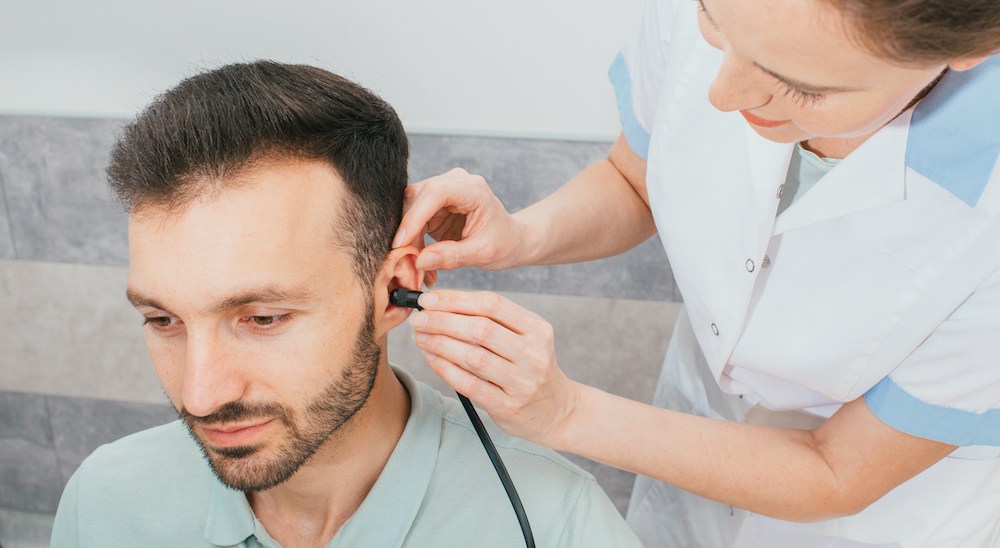Understanding Your Hearing Test Chart and Results
You sit down with your audiologist after your hearing test, and they slide

By: admin | June 24, 2024
Imagine this: It’s a peaceful Sunday morning. You’re enjoying your coffee, but the birds outside don’t seem to be chirping as loudly as they used to. Or perhaps you’ve been asking your family to repeat their words more often. These could be subtle hints that your hearing might need checked. Changes in hearing can be slow and not immediately noticeable. But catching these changes early can greatly improve your life and overall health. This will discuss some common signs that suggest it might be time for a hearing test, what to expect during the test and how it can help you keep your hearing health in check.
Consider regular hearing tests as more than just routine check-ups; they’re a key part of maintaining your overall health. These tests can help spot any changes in your hearing early on, allowing for quick intervention and potentially preventing further hearing loss. Plus, they can also reveal other health issues that may be linked to your hearing, such as high blood pressure or diabetes, making them an important part of your healthcare routine.
Noticing changes in your hearing can be a bit difficult, as these changes often happen slowly over time this is why you should have routine hearing tests. You might find yourself struggling to hear conversations in certain environments, often asking people to repeat themselves or turning up the TV or radio too high. If you’re experiencing any of these signs, it’s a good idea to schedule a hearing test. This simple step can help identify any changes in your hearing and provide the necessary solutions to improve your life.
Is your favorite music not sounding quite as lively as it used to? Or perhaps you’ve noticed that you’re turning up the volume on your TV more than before. These could be key indicators that it’s time for a hearing test. Did you know that nearly one in three people over the age of 65 experience some degree of hearing loss? This highlights the importance of regular hearing tests, especially as we age.
Here are a few signs to look out for:
Another sign of hearing loss can be age. As we grow older, our risk of experiencing hearing loss increases. This is not a cause for alarm but rather a reminder to prioritize regular hearing check-ups as part of your healthcare routine, especially as you start to get older.
Certain lifestyle choices can influence your hearing health. For instance, exposure to loud noises, whether from work environments or recreational activities like concerts or sporting events, can contribute to hearing loss over time. Similarly, smoking and poor diet can also affect your hearing. By being mindful of these factors and making healthier choices where possible, you can help protect your hearing health in the long run.
Not only can your lifestyle affect your hearing health but so can certain medications. Some drugs, known as ototoxic medications, can damage the inner ear, resulting in temporary or permanent hearing loss. If you’re taking any medications regularly, it’s important to discuss this with your audiologist during your hearing test. This will help them to know if a certain medication you are taking are causing hearing loss. They can provide guidance on how to manage this aspect of your health and potentially prevent further hearing loss.
Family history can play a significant role in your hearing health, your family history can provide your professional with knowledge if there is any underlying causes that may affect your hearing such as diabetes or cardiovascular issues. If you have a family history of hearing loss, it’s important to share this information with your audiologist. This information can help them better understand your risk factors and provide more personalized care during your hearing test.
Certain illnesses, such as diabetes, heart disease and certain infections might contribute to hearing loss by affecting blood flow or causing nerve damage, highlighting the interconnectedness of overall health and hearing. Proper management and timely treatment of these illnesses are crucial not only for overall well-being but also for preserving optimal hearing health. If you have any chronic illnesses, it’s important to discuss this with your audiologist during your hearing test. They can provide guidance on how to manage this aspect of your health and potentially prevent further hearing loss.
Physical activity is not only good for your overall health but also for your hearing health. Regular exercise increases blood flow to the ears, which is beneficial for the cells that pick up sound and send it to the brain. If you’re not currently active, consider incorporating some form of exercise into your routine and discuss this with your audiologist during your hearing test.
Mental health and hearing health are closely connected. Conditions like depression and anxiety can affect your ability to focus and pay attention to sounds, which can in turn affect your hearing. If you’re dealing with any mental health issues, it’s important to discuss this with your audiologist during your hearing test, as they can discuss coping strategies for your hearing health. They may recommend physical activities as this can help with the blood flow to your ear.
Stress and mental health can be a common part of your life, but did you know it can also impact your hearing health? Chronic stress can potentially lead to temporary or even permanent changes in your hearing. It’s important to manage stress levels and discuss any concerns with your audiologist during your hearing evaluation, as they may recommend relaxation techniques to reduce stress, so you can protect your hearing health. They can also provide helpful advice on stress management techniques that can contribute to better hearing health.
If you are stressed or were busy during the week, you may not have been getting enough sleep. Getting a good amount of sleep is not just important for your overall well-being, but it also plays a key role in maintaining good hearing health. Lack of sleep can lead to fatigue, which can affect the way you perceive and process sounds. If you’re having trouble sleeping or feel constantly tired, it’s important to ask your audiologist why you may not be sleeping if you are experiencing hearing loss.
So what happens during a hearing test? A hearing test is a simple and painless procedure carried out by an audiologist. It involves a series of examinations designed to assess your ability to hear different sounds, pitches and frequencies. The results of these tests provide valuable information about your hearing health and can help identify any changes or issues that may need addressing. This way, you’re not just aware of your current hearing status but also equipped with the knowledge needed to take proactive steps towards maintaining or improving it.
After your hearing test, understanding the results might seem a bit confusing. However, with a little guidance from your audiologist, you’ll be able to make sense of them in no time.
Your hearing test results are usually presented on an audiogram, a graph that plots the softest sounds you can hear at different pitches or frequencies. The graph can reveal patterns that indicate the type and degree of your hearing loss. Your audiologist will walk you through this chart, explaining what each part means and how it relates to your everyday listening experiences.
If your hearing test results indicate some degree of hearing loss, it’s important to remember that there are many ways to cope and live a fulfilling life. There are numerous resources available, including hearing aids and assistive listening devices, as well as strategies for effective communication and noise management. Your audiologist will work with you to develop a personalized plan that suits your lifestyle and needs.
Once you’ve completed your hearing test and understood the results, it’s time to consider the next steps. These steps are important in maintaining or improving your hearing health, depending on the outcomes of your test.
The first step is to follow any recommendations given by your audiologist. This might include using hearing aids or other assistive devices or making lifestyle changes. It’s also important to continue regular check-ups to monitor any changes in your hearing over time. By taking these steps seriously, you can ensure that you’re doing everything possible to protect your hearing health for years to come.
With the advancement of technology, there are now more ways than ever to support and enhance your hearing health. From hearing aids that can be controlled with a smartphone to apps that can provide captioning for phone calls, technology can be a powerful tool in managing hearing loss. Your audiologist can provide information on the latest technology that could benefit you.
Social interaction plays a vital role in your hearing health. Regular conversation exercises your ability to hear and understand speech, which can help maintain your hearing abilities. If you find yourself avoiding social situations due to difficulty hearing, it’s important to bring this up during your hearing test. They can suggest strategies or devices that can help you stay engaged and connected.
Taking care of your hearing health is important, and recognizing the signs that you need a hearing test is the first step towards maintaining or improving it. If you’ve noticed any changes in your hearing or if any of the signs mentioned resonate with you, don’t wait.
SLENT Hearing & Balance Center is here to help. Our team of experts can provide more information about hearing tests and guide you through the process. We are committed to helping improve your quality of life through better hearing health.
Contact us today at one of our locations below. We look forward to assisting you on your path towards better hearing health.
Tags: audiogram, speech tests

You sit down with your audiologist after your hearing test, and they slide
By: admin | January 19, 2026

Hearing loss is more than just a change in how you hear sounds. It often
By: admin | November 18, 2025

Most people don’t think much about their hearing health until they
By: admin | August 21, 2025
